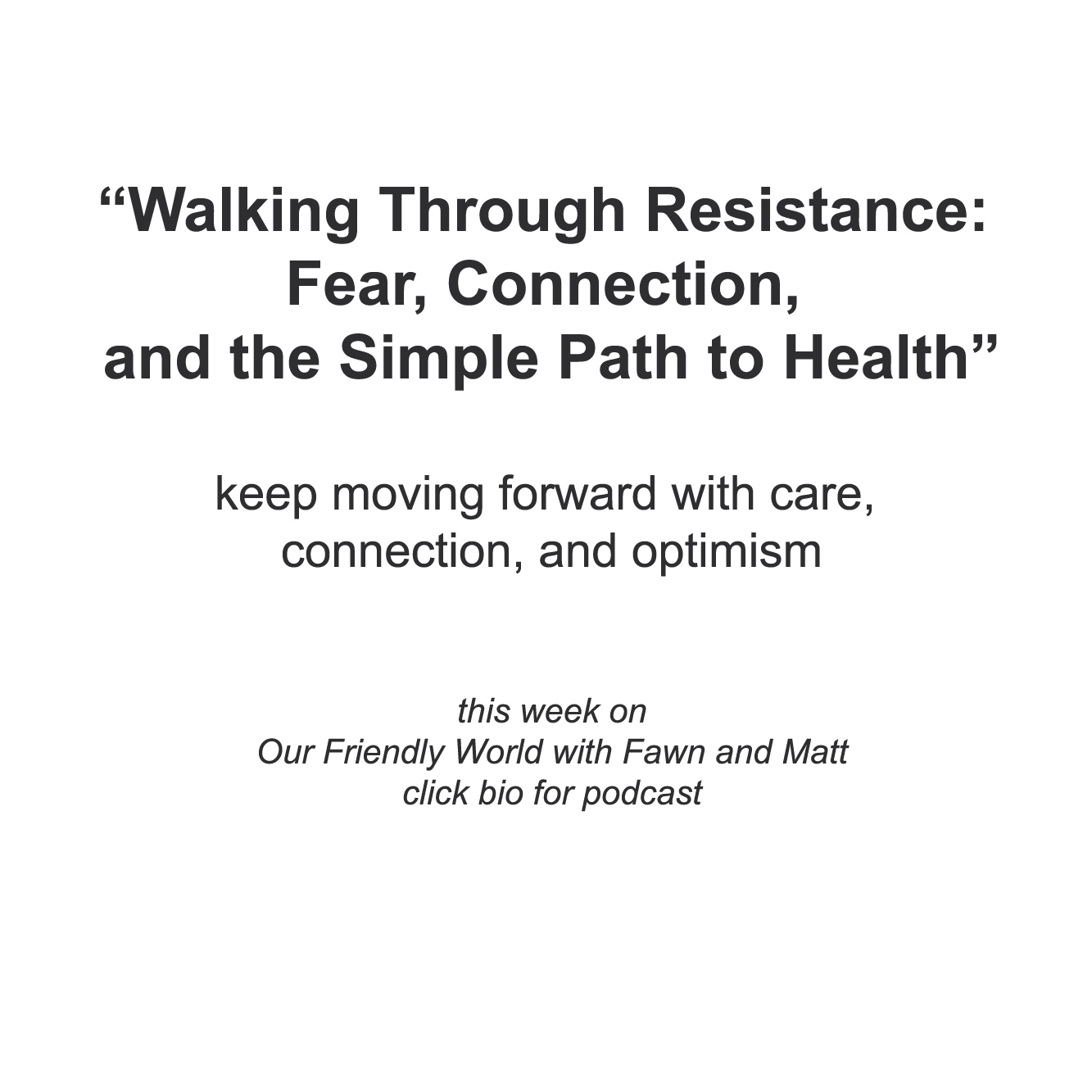Episode Transcript
MATT: [00:00:00] Hello everyone. Welcome back to our Friendly World with Fawn and Matt. This is Matt. Hey Fawn. How you doing? Ooh, we're quiet. Okay, so today we're talking about expecting good fortune. It's a very important thing, and I have to confess something to my audience. I. There have been moments where I have not expected good fortune, and guess what?
What we focus on is what happens, and it's a really hard thing.
In 1965, I. Psychologists did a, uh, performed an experiment and begins Pygmalion, something, something, something, something. But psychologists being psychologists in 1965 took over in elementary school and had all the little teachers do their biddings. And this test was actually not a terrible one, thank God.
'cause this was the era of Stanford prison experiments, et cetera. But what they did is they told Stu, they [00:01:00] told teachers that some of their students were, um. S uh, absolutely spectacularly. They were just late bloomers, but they were gonna bloom right now, so they had to be ready for it, and they had to pay attention to it.
Interesting experiment. What they found was with, or the published results that everybody knows is that the students who had these now, um, arbitrarily set high expectations, met them.
What's that about, moreover? Well, what's interesting is when you actually dive into it, you actually find out, no, no, no, no, no. That isn't exactly what happened. This was an elementary school as it turned out, first and second graders saw the most marked improvements, and actually it was, didn't make a difference in fifth and sixth grade.
Why is that? What's going on? So if you wanna equate and they equate it to IQ points, but if you wanna equate like doing better in school with good [00:02:00] fortune, which I think most people would, what happened? And I think what happens is back in first and second grade, we're very focused on, we don't have as much of a sense of ourselves and, and we're also parachuting into a new experience.
And all of a sudden, like our whole lives can change. We can be anybody we want. And I experienced this later in college, it seemed like, and I saw it happen. I didn't go to anybody in college who, I was in high school with, but I could see it in other people that they would kind of reinvent themselves.
And I saw that in high school too. I saw that between like middle school and high school, people would reinvent themselves because they felt afforded the opportunity and so they had an opportunity to change the way others perceive them by changing, and this is to me, to me, this is the key, and to me, this is my thought, but changing the way they perceive themselves.
[00:03:00] So all of a sudden, what was the thing? Things that they would change inside of themselves people would, people could and would react to because they would, they could smell these changes on others. They could smell the changes on the people. Now going back to this whole Pygmalion thing. First and second grade, teachers play an incredibly important role in everything, and I think at that age, typically more important than their peers.
So the teachers having those expectations, it's like, it's like the students could smell them and the students would then try and perform perhaps to please,
So expecting good fortune, how do we, how do we do anything with that? You know? Where's that even going? Well, there was studies and there's always studies, God help me more studies. Right. But, um, they gave people questions and they, they asked them about, negatives and how negative certain things would be.
So things like if you have [00:04:00] having, how terrible would it be if you had insomnia every day? And there's a certain type of people who are less likely to respect good fortune, and they would say, oh, well that's absolutely terrible. Uh, or deciding he chose the wrong career. Oh my god. That is terrible. That is, you know, that is practically the end of the world.
Or, what are the chances in the future that you will have a alcohol problem? You know? Uh, and people were like, oh, that would be terrible. And yet some people were, and these would be people who aren't expecting good fortune. These are people who don't understand that as we go through life, we change, we grow, we evolve because if I have insomnia every day, I know theoretically I can just work out like a fiend or meditate or whatever it is, and I'll just, boom, I'll just [00:05:00] go to sleep.
That's it. Or maybe I'll stay up later than normal. Just my, my whole brain functions will just shut down. I will just be so tired, or, you know, if I chose the wrong career, pick a new one and it sounds super easy and super, whatever. But I've been in similar situations, and when I look back, it was never easy, but it was always a possibility.
It was always a choice. And if I'm expecting good things to come out of that,
but where and how, and it's the wheres and hows and I'm, yeah, Juan's still right here. But yeah. Um, I was hoping to bounce that idea off of her, but where I, where I come to think about it is, is as far as. in sports, there's this whole sense of positive visualization, and we can point to that as being like, well, this obviously works because, you know, sports teams do it and successful sports teams do it, seem to do [00:06:00] it better than unsuccessful sports teams.
So it, it starts to take us away from, uh, almost like getting out of our own way and, trying to say, well, this feels like pseudoscience. This doesn't feel real, this doesn't feel honestly, sometimes I'll rehearse and you know, they say if you fail to plan, you plan to fail. So if I'm giving a talk, I plan it.
If I'm giving, if I'm interviewing for a job, I plan it. If I am building something from a computer programming frame of mind, I build it in my head first. And then I start building it and maybe it's crap and I throw it out and I try it again and maybe it's crap again. And I throw it out and I try again.
I actually did this recently, so this is not so far fetched.
And if we take it down to more of an interpersonal level, person to person. Let's pretend. Close your eyes and let's pretend. Let's pretend you were [00:07:00] going out on a blind date. I know. I know. I'm married. I've been married forever. And let's pretend that you didn't do what all my friends seem to do. Oh my God.
Which was like, oh, why is that person looking for a date? Or they blah, blah, blah, blah, blah. But let's pretend you were told, oh my God. Yeah, you're gonna love this person. They're friendly, they're nice, they're outgoing, they're. Okay, so about, I think it's 4, 3, 4, 5. Things are gonna happen as soon as you like, sit down across from this person.
Hopefully you're gonna be relaxed, but you're expecting good things to happen because you've already gotten half of a heads up by, by hearing this person is nice by hearing this person is outgoing. So literally the first thing you're gonna do. is you're gonna relax. Second thing you're gonna, you're gonna do is you're probably gonna smile the instant you smile.
Guess what? Regardless of what the other person [00:08:00] was doing, hopefully the other person was smiling, but if they weren't, odds are they're gonna start smiling too. And as soon as you see them smiling, all of a sudden you're gonna get this weird confirmation. You're gonna get a confirmation that, hey, guess what?
this person is nice and friendly. Then you're gonna launch into, hey, so... but you've already now had these like little tiny little computer program, we call them micro transactions 'cause we're weird that way. 'cause we feel the need to define. But you're gonna discover that all of a sudden maybe you're creating a self-fulfilling prophecy.
Whereas if you're told maybe this person isn't so nice. Conversation may be difficult because of this reason or that reason, or the other reason you're gonna have trepidations walking in you're gonna have trepidation, you're gonna be maybe anxious, you're gonna be nervous, they're gonna react to that.
It's gonna be this weird other kind of much more negative conversation. Because you're kind of expecting things to maybe go off the rails [00:09:00] as opposed to just focusing on, which is something else I'm so keen on is, if there's a pothole in the road, try and see past it. Because if you don't, you're going hit it.
And I that, I swear I went for a drive yesterday. I think I hit every single pothole 'cause I was so focused on them.
So if you don't expect good fortune, what can you do about it? And for me, was the real trick. Once upon a time, happy go lucky Matt. And then not so happy go lucky, Matt. I don't wanna talk about how that happened, but. How do I get back? How do you get something back?
And obviously I was desperate to reverse my fortune, right? As as I think most people would be, right? Well, if things are going great, things are going great. But if things aren't going great, what can I do? What can I do? What can I do? And you know, it's, there's a million superstitions behind it but honestly.
Honestly,
some of it [00:10:00] was getting outta my own way, and I was so desperate to avoid the bad that I focused on it as my pothole, and I couldn't escape it. Kaboom, kaboom, kaboom.
I had to get outta my own way. And for me, getting out of my own way means stop. Just stop, breathe. Just breathe. Do something different, even if it's walking north instead of south.
And that at least starts to disconnect me from this connection I have or I was having with, , bad fortune. And once I was able to just pry into that just a little,
then I could take a look at the things I had done. That were successful because even if you're in a, even if you're, if, even if you're having a bad role right now, at some point it wasn't all bad. [00:11:00] And being able to focus on those days and then out of the blue ahead, the world's smallest success. Then I focused on that.
I didn't focus on all the other BS that was happening all around. I just focused on that one tiny little success,
and then it started to build and build and build and build and build until eventually I naturally just expected good things to happen.
Fawn: Can you share what that one little thing was?
MATT: So this is back when we lost our house. We were homeless.
I was desperately trying to find a job
and I was thinking, uhoh, is this how it's going to be?
And I got a callback. That was it. [00:12:00] And then I sucked, but I got a callback. And that to me was the key. Is I focused only on the positive aspect of it. I focused not at all on any of the negative aspects around it, which was, and I know a lot of people are, are feeling this now 'cause I know a lot of people are feeling this now, but they're, they're, they feel like they, you, you lose your job, you start sending resumes out into the void and you never hear back.
Or if you do hear back, you get an interview. You got an interview after you sent out a thousand resumes, and I, I hear these stories, right?
Fawn: Or you go on a million auditions or you
MATT: go on a million auditions
But to me, it's about focusing on the success and being a goldfish to quote Ted lasso about all the bad stuff.
But you're an elephant when it comes to the good stuff.
And it's about [00:13:00] celebrating the win, even if it's just a little yippy to yourself.
And from there, we build. That's what I've got today.
Fawn: Thanks, Matt.
MATT: Okay, everybody. Like I said, focus on a win. You know what? If you want a cheap, easy win, send us an email. We will email you back, okay? Praying for you. Be well.


